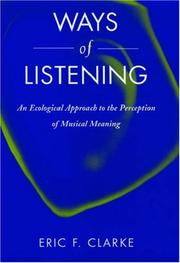| Listing 1 - 6 of 6 |
Sort by
|
Book
Abstract | Keywords | Export | Availability | Bookmark
 Loading...
Loading...Choose an application
- Reference Manager
- EndNote
- RefWorks (Direct export to RefWorks)
Music --- improvisatie --- muziekpedagogiek --- muziek --- muziekonderwijs --- muziekgeschiedenis
Book
ISBN: 9780199553792 0199553793 Year: 2011 Publisher: Oxford ; New York : Oxford University Press,
Abstract | Keywords | Export | Availability | Bookmark
 Loading...
Loading...Choose an application
- Reference Manager
- EndNote
- RefWorks (Direct export to RefWorks)
Music --- Consciousness. --- Musique --- Conscience --- Psychological aspects. --- Philosophy and aesthetics. --- Aspect psychologique --- Philosophie et esthétique

ISBN: 0195151941 0199870403 1602569452 9786610482429 1423745884 1280482427 0195348540 0199773904 9780199773909 9780195151947 Year: 2005 Publisher: Oxford ; New York Oxford University Press
Abstract | Keywords | Export | Availability | Bookmark
 Loading...
Loading...Choose an application
- Reference Manager
- EndNote
- RefWorks (Direct export to RefWorks)
In recent years, many psychologists and cognitive scientists have published their views on the psychology of music. Unfortunately, this scientific literature has remained inaccessible to musicologists and musicians, and has neglected their insights on the subject. In Ways of Listening, musicologist Eric Clarke explores musical meaning, music's critical function in human lives, and the relationship between listening and musical material. Clarke outlines an "ecological approach" to understanding the perception of music. The way we hear and understand music is not simply a function of our brain structure or of the musical "codes" given to us by culture, Clarke argues. Instead, cognitive, psychoacoustical, and semiotic issues must be considered within the physical and social contexts of listening. In essence, Clarke adapts John Gibson's influential ecological theory of perception to the complex process of perceiving music. In addition to making a theoretical argument, the author offers a number of case studies to illustrate his concept. For example, he analyzes the experience of listening to Jimi Hendrix's performance of the Star Spangled Banner at Woodstock in 1969. Clarke examines how Hendrix's choice of instrument and venue, use of distortion, and the political climate in which he performed all had an impact on his audience's perception of the anthem. A complex convergence of broad cultural contexts and specific musical features - the entire "ecology" of the listening experience - is responsible for this performance's impact. Including both the best psychological research and careful musicological scholarship, Clarke's book offers the most complex and insightful perspective on musical meaning to date. It will be of interest to musicologists, musicians, psychologists, and scholars of aesthetics.
Music -- Perception --- Musical perception --- Musicologie --- Musicology --- Musique -- Perception --- Muziek -- Perceptie --- Muzikale perceptie --- Muzikale waarneming --- Oreille absolue --- Oreille musicale --- Perception de la musique --- Perception musicale --- 571 --- Muziekpsychologie --- Music --- History and criticism --- Nature (Aesthetics) --- Art and nature --- Nature and art --- Musicology. --- Perception. --- Perception --- Aesthetics --- Criticism --- Auditory perception --- Psychological aspects
Book
ISBN: 9780198525578 0198525575 0191689351 Year: 2010 Publisher: Oxford ; New York : Oxford University Press,
Abstract | Keywords | Export | Availability | Bookmark
 Loading...
Loading...Choose an application
- Reference Manager
- EndNote
- RefWorks (Direct export to RefWorks)
What is it that makes people want to live their lives to the sound of music, and why do so many of our most private experiences and most public spectacles incorporate - or even depend on - music? 'Music and Mind in Everyday Life' uses psychology to understand musical behaviour and experience.
Music --- Psychological aspects. --- Musique --- Aspect psychologique --- Music, Dance, Drama & Film --- Music Philosophy --- Psychological aspects
Book
ISBN: 9780199355914 0199355916 Year: 2018 Publisher: London, New york oxford University Press
Abstract | Keywords | Export | Availability | Bookmark
 Loading...
Loading...Choose an application
- Reference Manager
- EndNote
- RefWorks (Direct export to RefWorks)
Creative practice in music takes place in a distributed and interactive manner embracing the activities of composers, performers and improvisers-despite the sharp division of labour between these roles that traditional concert culture often presents. Two distinctive features of contemporary music are the greater incorporation of improvisation and the development of integrated and collaborative working practices between composers and performers. By blurring the distinction between composition and performance, improvisation and collaboration provide important perspectives on the distributed creative processes that play a central role in much contemporary concert music. This volume explores how collaboration and improvisation enable and constrain these creative processes.
Composition (Music) --- Improvisation (Music) --- Music --- Extemporization (Music) --- Collaborative composition (Music) --- Artistic collaboration --- Collaboration --- History and criticism --- Performance
Book
Year: 2005 Publisher: Liège Société européenne des sciences cognitives de la musique
Abstract | Keywords | Export | Availability | Bookmark
 Loading...
Loading...Choose an application
- Reference Manager
- EndNote
- RefWorks (Direct export to RefWorks)
| Listing 1 - 6 of 6 |
Sort by
|

 Search
Search Feedback
Feedback About UniCat
About UniCat  Help
Help News
News